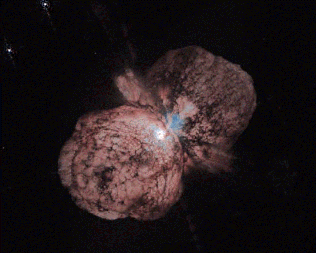
The SCarab Page of Science

My Teaching Page
My Astronomy Page
My Chaos Page
Math 1 (divisibility) (uses JavaScript)
Science Articles
Science Links
I'm a graduate student studying physics. Of course I've found out a lot of things about science. I figured I'd share a few of them.I'm of the opinion that reality is intrinsically interesting, or fun, or cool, or whatever. It's possible to take things apart, figure out how they work. Or build something completely new, based on things you know about. Computers are a nice way of making new things (programs, pictures, sounds) without ever being undoable. They make things a step removed from concrete reality, but the way of picturing how a program should come together really isn't all that different from seeing how some physical apparatus should be put together, how to get things to work the way you want them to. Everything's got a certain sort of sense behind it. Often, I benefit more from a sense of intuition as to how to attack the problem than the actual logical process of solving it.
I've taught Physics 152, an introductory course mostly for engineers. Through that experience, I've become convinced that everyone has the mental capacity to learn physics, to develop that sort of intuition of how to deal with problems and look at real, phisical situations. Those students who performed most poorly were almost always those who didn't care at all. But some of the more frustrating students were those more focused on the grade than anything else, and so always wanted to be told how to get the answers, not the physical meaning behind them. It's been a while now since I've taught, so I decided to write down some of the bits of advice for students that I'd given those semesters. You can find them here, on my teaching page.
I've been focusing entirely on research lately, in high energy physics. Unfortunately, most of this stuff is of relatively little interest to non-specialists. I am still convinced that if anyone is interested in this stuff, I could teach those bits I know enough about; and that all of it is learnable. Still, for right now at least, I think I'll leave the rest of this topic to links to high energy physics, available on my science links page.
For most of my life, I've been interested in astronomy. That's the reason behind the theme of this page. The image at the top is one of my favorite Hubble Space Telescpe pictures: Eta Carinae. Eta Carinae is an exploding star. Because of its magnetic field, the gas is expanding in two lobes opposite each other, with a disk in the middle. Like I said, reality is cool. (And it's pictures like this that make me annoyed that Star Trek and Star Wars have wasted perfect opportunities to use their outstanding special effects to show more realistic large-scale explosions.) There are enough things I like about astronomy for it to warrant its own page, linked here.
More recently, I've become very interested in a rather new branch of science: chaos. I love silly little math games and tricks which exist for no reason other than to see what strange things the rules get you to. Well, chaos has taken many things like this, and found real-life applications for them. Or else found even more games with no apparent purpose. Also, highly interesting chaotic problems can be incredibly easy to program on a computer. That's why I chose a fractal pattern as my first programming project: it was easy enough for me to try, yet hard enough that I couldn't do it in a reasonable amount of time with just pencil and paper. And, I knew that it would turn up interesting results, some of which may never have been seen before (it's so simple that someone probably already has, but I've never seen anything quite like some of my patterns before). So, come join me in chaos.
I have enjoyed playing around with different mathematical ideas quite a bit. Recently, I've done quite a lot of playing around with prime numbers, and come up with some pretty interesting ideas. I haven't yet built a page about that yet, but I have built a page about some relatively simple properties of numbers: simple tests to see whether or not an integer is evenly divisible by one of the smaller integers. I chose to use a JavaScript interface, since I'm learning JavaScript, and it seems like a useful way to gather this information. So enjoy my first math page.
Finally, there are some science-related sites I've visited that are very interesting, but I couldn't fit into one of the other categories. They're all here, on my links page.
All of the links mentioned above:
Teaching
Astronomy
Chaos
Math 1 (divisibility)
Science Articles
Science LinksHere's a list of some of my favorites of the science-related articles I've scanned:
"Magic" crystals: doing bizarre things with photorefractive materials.
Earth may have gotten much of its water from a constant rain of tiny comets.
Instant Evolution: an interesting case of a new species of kangaroo appearing in only 60 years.
The loudest sounds, and sonic cooling.
Speculation that a former fifth planet may have exploded relatively recently.
Last Updated 12/18/99